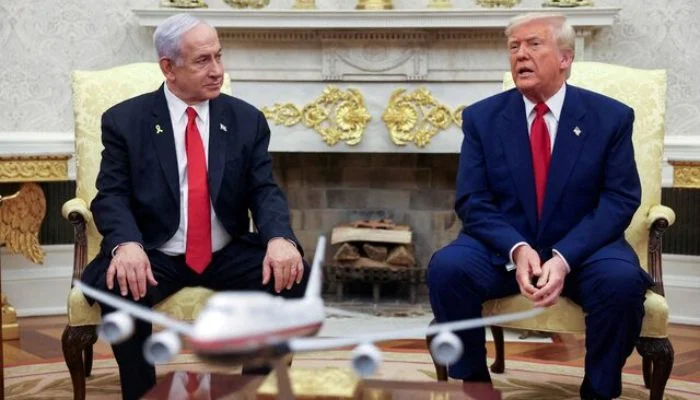The Qatar bombing has tested the strength of the Trump-Netanyahu alliance, exposing tensions between Washington and Jerusalem after Israel carried out surprise strikes in Doha. President Donald Trump said he was “very unhappy about every aspect” of the operation, while analysts noted that disagreements are unlikely to rupture the long-standing partnership.
Israeli Strikes in Doha
On Tuesday, Israeli Prime Minister Benjamin Netanyahu ordered airstrikes on Hamas leaders in Doha. The strikes targeted political offices of the Palestinian group but failed to eliminate their leadership. Instead, six people, including a Qatari security agent, were killed.
The attack shocked Washington. U.S. officials confirmed Israel gave no formal warning before launching the operation. This omission angered Trump, who had just months earlier signed a sweeping defense deal with Qatar, home to the largest U.S. military base in the Middle East.
Trump Voices Frustration
Speaking after the strikes, Trump admitted his displeasure. “I am very unhappy about every aspect of this,” he said. On Truth Social, he later wrote that the bombings “did not advance U.S. or Israeli interests.” Still, he added that eliminating Hamas remained “a worthy goal.”
Trump’s response reflected the complexity of his relationship with Netanyahu. While he disagreed with the tactics, he shares Netanyahu’s view that Hamas must be weakened beyond its military strength.
Israel’s Pattern of Acting Alone
This was not the first time Israel had acted without consulting Washington. In September 2024, Israeli forces injured thousands of Hezbollah fighters using booby-trapped devices, a move that blindsided then-President Joe Biden.
Once again, Netanyahu showed he would not hesitate to act independently, even when U.S. interests were at stake. Analysts say this approach risks undermining Trump’s diplomatic agenda in the Gulf, particularly efforts to expand the Abraham Accords.
Read: Erika Kirk Carries Forward Legacy of Faith and Family
Analysts Weigh In
Aaron David Miller, a former U.S. peace negotiator, explained that Trump remains guided by instinct. “He agrees with Netanyahu’s notion that Hamas cannot just be hollowed out. It needs to be fundamentally weakened,” Miller said.
Dennis Ross, another veteran diplomat, suggested Trump may eventually pressure Netanyahu. “As his Arab friends complain to him about what Israel is doing — and they are doing so now — he may say, give me a credible plan for the day after in Gaza, and I will tell Bibi you have done enough,” Ross said.
Regional Fallout
The Doha strikes further strained Israel’s standing among Gulf allies. Qatar condemned the attack as a violation of sovereignty, while Arab governments warned the escalation could derail future cooperation.
The bombings also risk complicating Trump’s goal of persuading more Arab states to normalize ties with Israel. Analysts say the fallout could set back regional diplomacy for months, if not longer.
Gaza War Context
Israel’s military actions remain tied to the October 2023 Hamas-led attack in southern Israel, which killed hundreds. Since then, Israel has pursued a relentless campaign in Gaza, provoking international outrage as famine conditions spread.
Trump has provided political cover for Israel, but the Doha strikes may push him to demand clearer boundaries. European allies, too, have criticized the escalation, increasing pressure on Washington to rein in Netanyahu.
Trump and Netanyahu’s Uneasy Partnership
The Trump-Netanyahu alliance has always been volatile. White House officials describe it as “hot and cold since the campaign.”
Earlier this year, Trump traveled to Saudi Arabia, Qatar, and the UAE but skipped Israel, a move interpreted as a deliberate snub. Still, he returned to office in January promising to restore ties with Netanyahu after a rocky period under Biden.
In June, their partnership briefly warmed again. When Israel launched a major air offensive against Iran, Trump surprised allies by deploying B-2 bombers to destroy Iranian nuclear facilities. That move strengthened goodwill with Netanyahu but conflicted with Trump’s campaign pledge to reduce foreign entanglements.
A Cycle of Agreement and Friction
Despite occasional alignment, friction remains constant. After the Iran strikes, Trump scolded both Tehran and Jerusalem for undermining a U.S.-brokered ceasefire. In July, Washington appeared to criticize Israel’s attack in Damascus, which destroyed part of Syria’s defense ministry.
Tuesday’s operation in Doha fit the same pattern. U.S. officials confirmed Israel notified Washington only shortly before the strikes, with no real coordination. This raised questions about whether Netanyahu sees Trump as a partner or merely an ally to be managed.
The Road Ahead
Michael Oren, Israel’s former ambassador to the United States, believes the relationship will hold. “If Netanyahu can continue to appeal to those two sides of this president — strength and ending wars — then he will be okay. I’m not concerned about the relationship,” Oren said.
Jonathan Panikoff, a former U.S. intelligence officer, framed the issue differently. “The U.S. can seek to cajole and push Israel,” he said, “but Netanyahu will continue to act in a manner that he views as in Israel’s best interests alone.”
For now, the Trump-Netanyahu alliance appears resilient, even under stress. But as more Arab states voice anger and regional instability deepens, Trump may find his patience tested again sooner than expected.
Follow us on Instagram, YouTube, Facebook,, X and TikTok for latest updates
